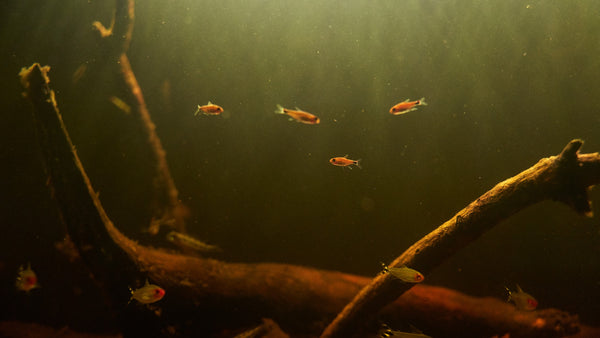- Continue Shopping
- Your Cart is Empty
"Tintmail", revisited...
From time to time, in between the questions about biofilm, biotopes, and leaf litter, I'll get questions asking all sorts of stuff.
I love it!

Here are a few, from recent email/DMs, which may be of interest to you...
Which botanical material we recommend to keep your water that dark brown tint?: I have a few recommendations, based on my experience and (admittedly biased) taste. So, here are my fave "tint-producing" botanicals...in no particular order:
Catappa Bark
Sappanwood Pods
"Ceu Fruta"
Texas Live Oak Leaves"
Coco Curls
"Rio Fruta"
Alder Cones
Banana Stem Pieces
Encontro Pods
Oak Branches ("Twenty Twigs")
Magnolia Leaves
Catappa Leaves
Mangrove Leaves
Guava Leaves

The caveat: These are materials which, IMHO really seem to produce the most rich-colored water and effects. Now, sure, there are probably 40 other items we offer that can accomplish the same task; these ones just seem to do it faster and with greater effect. Of course, if you're running activated carbon or materials like Purigen in your filter, these media will minimize or eliminate almost entirely any coloration these botanicals impart into the water.
"Pro Tip": You can usually get some indication as to what color and how intense the color a given botanical will impart into your water when you prepare it...That initial burst of tannins and other coloring compounds is immediately obvious and probably quite helpful in determining the color "palette" to expect!

My personal fave "tint bomb?": Well, scientific research indicates that Catappa Bark seems to have a very concentrated quantity of tannins and other compounds bound up in its tissues, which means you don't need to use a ton of the stuff in most aquariums to enjoy the benefits of its capabilities (the imparting of tannins and humic substances, and the visual tint). We offer three different varieties, because I'm obsessed with the stuff!
I personally feel that it "lasts" a long time (a month or two, at least) in terms of imparting color into the water. And it looks cool. Yes, it actually has an incredible aesthetic that makes it even more attractive from multiple standpoints.

Just how long does this botanical stuff last?: Many of the less durable botanicals will last several months, at least "structurally", but might be far more limited in terms of their impartation of color to the water- perhaps a few weeks in many cases.

What do I need to do to keep my blackwater tank "dark?": Monitoring pH, visual tint, nitrate and phosphate are but a few of the things you should undertake as part of the active management of a blackwater aquarium. Water exchanges are the other. And regular replenishment of botanicals. To me, that's a huge part of the fun. We offer general guidelines and "best practices", but really, each tank is a "one off", and more customized approaches are the way to go. Again, this is what makes our little sector of the hobby so compelling, IMHO.

What's your number one concern about botanical-style aquariums?: I'm still concerned about the newbie to our botanical-style aquarium practice going too fast- dumping a huge amount of botanical materials into an established, relatively stable aquarium, and causing a massive increase in CO2 and a level of organic material that overwhelms the ability of the resident denitrifying bacteria population to break down the organics...
The human element.
A disaster that can ensue...
That sort of thing is always still possible. And it's within our control. That's what you read blog after blog written by me urging you to go slowly. To observe your tank and fishes. And to test the water regularly...and do regular water changes as part of your husbandry regimen.
The usual stuff.
And your best overall hobby advice?: Just because you reject the "status quo", the popular, or the safe, doesn't mean that you're wrong. Just because your idea of an aquascape features soil and decomposing leaves instead of a cliche-ridden "Middle Earth Hobbit-Forest" doesn't mean you're not creating aspirational work. Just because you're breeding Danios instead of this month's "Apisto of The Month" doesn't mean you're not talented. Just because you're specializing in Anacharis instead of Bucephalandra doesn't mean that you don't have "plant game."
Etc.
Be you.
That's it for this round of "Tintmail..."
Stay innovative. Stay curious. Stay diligent. Stay consistent. Stay unbridled by convention...
And Stay Wet.
Scott Fellman
Tannin Aquatics







Scott Fellman
Author